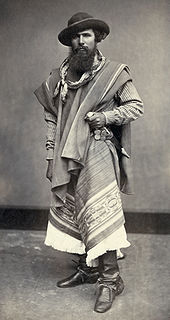 W
WA herder is a worker who lives a pastoralist life gathering and caring for a herd of domesticated livestocks. Different to a husbandry worker, who works at fixed grazing settlements known as ranches, herders move with the livestocks wandering around open wild pastures in a nomadic/semi-nomadic fashion.
 W
WHerding is the act of bringing individual animals together into a group (herd), maintaining the group, and moving the group from place to place—or any combination of those. Herding can refer either to the process of animals forming herds in the wild, or to human intervention forming herds for some purpose. While the layperson uses the term "herding" to describe this human intervention, most individuals involved in the process term it mustering, "working stock", or droving.
 W
WA gaucho or gaúcho is a skilled horseman, reputed to be brave and unruly. The gaucho is a symbol in Argentina, Uruguay, Rio Grande do Sul state in southern Brazil, and the southern Chilean Patagonia. Gauchos became greatly admired and renowned in legends, folklore and literature and became an important part of their regional cultural tradition. Beginning late in the 19th century, after the heyday of the gauchos, they were celebrated by South American writers.
 W
WA goatherd or goatherder is a person who herds goats as a vocational activity. It is similar to a shepherd who herds sheep. Goatherds are most commonly found in regions where goat populations are significant; for instance, in Africa and South Asia. Goats are typically bred as dairy or meat animals, with some breeds being shorn for wool. The top six goat industry groups in the United States include: meat, dairy, fiber or hair, 4-H, industrial, and biotech.
 W
WMany animals, including humans, tend to live in groups, herds, flocks, bands, packs, shoals, or colonies of conspecific individuals. The size of these groups, as expressed by the number of people/etc in a group such as eight groups of nine people in each one, is an important aspect of their social environment. Group size tend to be highly variable even within the same species, thus we often need statistical measures to quantify group size and statistical tests to compare these measures between two or more samples. Group size measures are notoriously hard to handle statistically since groups sizes typically follow an aggregated (right-skewed) distribution: most groups are small, few are large, and a very few are very large.
 W
WA herd is a social group of certain animals of the same species, either wild or domestic. The form of collective animal behavior associated with this is called herding.
 W
WKulning or herding calls is a domestic Scandinavian music form, often used to call livestock down from high mountain pastures where they have been grazing during the day. It is possible that the sound also serves to scare away predators, but this is not the main purpose of the call.
 W
WReindeer herding is when reindeer are herded by people in a limited area. Currently, reindeer are the only semi-domesticated animal which naturally belongs to the North. Reindeer herding is conducted in nine countries: Norway, Finland, Sweden, Russia, Greenland, Alaska, Mongolia, China and Canada. A small herd is also maintained in Scotland.
 W
WA shepherd or sheepherder is a person who tends, herds, feeds, or guards herds of sheep. Shepherd derives from Old English sceaphierde. Shepherding is one of the world's oldest occupations, and existing in agricultural communities around the world and an important part of pastoralist animal husbandry.
 W
WA stock horse is a horse of a type that is well suited for working with livestock, particularly cattle. The related cow pony or cow horse is a historic phrase, still used colloquially today, referring to a particularly small agile cattle-herding horse; the term dates to 1874. The word "pony" in this context has little to do with the animal's size, though the traditional cow pony could be as small as 700 to 900 pounds and less than 14 hands high.